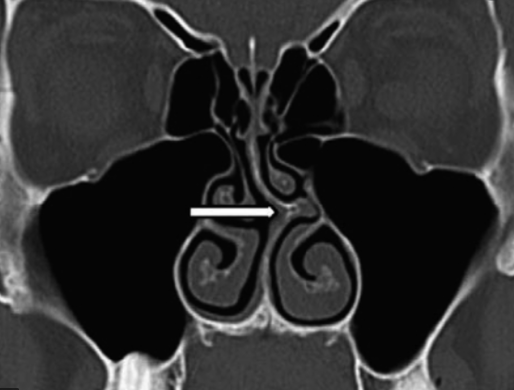Common causes of nasal obstruction
The deviated septum is shown by the arrow, bending over to the right of the picture on this CT scan.
Nasal septal deviation
The nasal septum is the cartilage partition that separates the two sides of the nose. If the septum is bent, it can cause blockage. This is often caused by previous trauma to the nose (eg a broken nose) but sometimes people are born with a bent septum. If the bend in the septum is bad enough, you may be offered either a septoplasty (to correct the bend in the cartilage) or a septorhinoplasty (to correct and deviation of the nasal bones if neccessary). Sometimes other conditions co-exist (eg chronic rhinosinusitis or allergic rhinitis), which means that even if the septum is straightened, you may need to continue other treatments (eg nasal steroid sprays, saline washes) in the long term to get maximum benefit. Septoplasty is an effective treatment for the right patients, but there are some risks, which include: bleeding, infection, failure/recurrence, and rarely cosmetic deformity (a “saddle” nose) or septal perforation (a hole inside the nose).
Chronic Rhinosinusistis
This is an inflammation of the lining of the nose and sinuses which causes nasal blockage and/or discharge. Sometimes facial pain and/or reduced sense of smell is also present. Symptoms occur most days of the week for 3 or more months. The mainstay of treatment is with nasal steroid sprays and regular (eg twice daily) saline nasal douches (eg Neilmed or Sterimar; or you can make up your own for free with this recipe sheet). If allergy is a factor, a daily antihistamine may also help and sometimes a long course of antibiotics is also useful.
Sinus surgery (FESS; Functional Endoscopic Sinus Surgery) is only indicated once these treatments have been properly tried (and failed). The aim of FESS is to widen the openings to the sinuses so that the steroid sprays and saline douches can get into the sinuses better, so it is important that you continue these afterwards. Complications of FESS include: bleeding, infection, failure/recurrence; and very rarely double vision, visual loss, watery eye, meningitis, CSF (brain fluid; cerebrospinal fluid) leak.
The polyp is the pearly white lump in the middle of the picture.
Nasal polyps
These are most commonly seen in some patients with chronic rhinosinusitis, although they can rarely occur as part of other conditions affecting different parts of the body (eg lungs, kidneys). Polyps in the nose are usually inflammatory - the lining of the nose becomes so swollen that it develops into a gelatinous sac. Treatment is with nasal steroids and sometimes with oral steroid tablets, but if these are ineffective then surgery is helpful. Unfortunately, polyps usually recur eventually but surgery can usually give good relief of nasal obstruction, sometimes even for many years.
Polyps which occur only on one side need urgent investigation since they may be cancerous.


